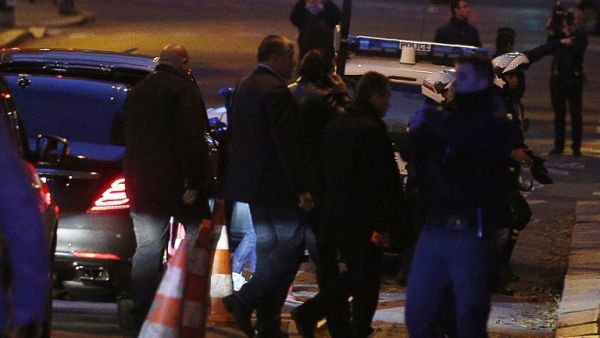- Resigned Lebanese PM Saad Hariri has arrived in France from Saudi Arabia
- He will meet with French President Emmanuel Macron on Saturday
- Macron said he would welcome Hariri as a prime minister
- Hariri had denied rumors that he was being held by Riyadh
French President Emmanuel Macron said he would welcome Saad Hariri at the Elysee Palace as Lebanon’s prime minister, as Hariri denied rumors over the circumstances surrounding his two-week stay in Saudi Arabia.
Macron’s remarks came as Hariri and his family arrived in France on Saturday for a visit at the French president’s invitation, in a move aimed at defusing a two-week political crisis sparked by the mysterious circumstances surrounding Hariri’s resignation from the premiership in a televised speech from Riyadh on Nov. 4.
Speaking to reporters at the end of an EU summit in Sweden Friday, Macron said he would welcome Hariri in Paris as Lebanon’s premier and expected him to return to Beirut in the “coming days, weeks.”
"I will ... welcome Prime Minister Hariri with the honours that are due to a prime minister, indeed resigned, but whose resignation hasn't yet been recognised in his country, as he hasn't been there," Macron said.
He added that Hariri “has the intention, I believe, of going to his country in the next days or weeks.”
- Sources 'Close to Hariri' Say He Will Return Soon to Lebanon, Reports Claim
- 'Detained' Hariri Accepts Macron's Invitation to Paris
Macron’s office said Hariri was expected at the presidential palace by midday Saturday.
The French president said Hariri could stay in Paris for weeks should he choose. “It is an invitation of friendship for discussion and receiving a prime minister of a friendly state,” Macron said.
Since Hariri announced his resignation, which sent shockwaves in Lebanon and the region, Saudi officials and media outlets have been referring to Hariri as “resigned” or “former” prime minister.
Hariri Friday dismissed as “rumors” reports that he was being held against his will in Saudi Arabia, saying in a tweet that his stay in Riyadh was for consultations on Lebanon’s future and its relations with Arab countries.
“My stay in the Kingdom of Saudi Arabia was to hold consultations on the future of the situation in Lebanon and its relations with its Arab environment,” Hariri posted on his Twitter account. “Stories spreading about my stay and departure or that deal with the circumstances of my family are merely rumors.”
Hariri’s prolonged absence has fueled speculation that he was not free to travel, with Aoun going so far as to say he had been “detained.”
Saudi Foreign Minister Adel al-Jubeir Thursday rejected Aoun’s accusations, declaring at a joint news conference in Riyadh with his French counterpart Jean-Yves Le Drian that Hariri was free to leave the kingdom whenever he wants.
- 'Free Saad Hariri': Lebanese Convinced Saudis Are Holding Former PM, as Conspiracy Theories Circulate
- Lebanese Run a Marathon to 'Free' Hariri from Saudi
The Elysee Palace said in a statement that Macron would meet Hariri for talks, likely to focus on the political crisis caused by Hariri’s resignation. After receiving Hariri, Macron would meet with Hariri’s family. Later, the French president would host a lunch for Hariri and his family, the statement reported by the National News Agency, said.
Macron Wednesday extended the invitation for Hariri and his family to visit Paris. Hariri has been in Riyadh – save for a flying visit to Abu Dhabi – since Nov. 3, a day before announced his resignation.
France’s intervention was the latest in a string of European efforts to defuse the tensions over Lebanon fueled by Hariri’s resignation.
The resignation came against the backdrop of spiraling tensions between regional rivals, Saudi Arabia and Iran, which are vying for power and influence in the volatile region. The two powers are backing opposing sides in conflicts in Yemen, Syria, Iraq and Lebanon.
This article has been edited by Al Bawaba from its original version








